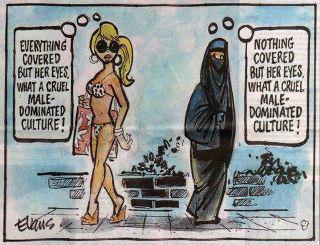This is a cross-post from James Bloodworth at Obliged to Offend
I noticed recently a cartoon on Facebook which could be said to represent the relativist view of women’s rights. While the cartoon is quite possibly a joke, the implied message is unambiguous. The picture, which I have included above, draws an equivalence between an item of clothing that women wear freely with one that is in many instances forced upon the wearer by men.
To point this out to most people would be uncontroversial. No woman has yet been beaten up, imprisoned or raped for not wearing a bikini to the beach. A woman walking around in a niqab in the UK may regrettably be subjected at times to verbal abuse, but a woman dressed in revealing clothes runs a far greater risk of harassment, unwanted sexual advances and assaults due to the same attitudes that in other circumstances seek to shroud female flesh in niqabs and burkas – that is, a desire to assert control over female sexuality or repress it. Both women in the cartoon are more likely to suffer male violence when they wear less, rather than when they cover up.
It is sometimes forgotten that hatred towards female sexuality is often directed at the most beautiful women precisely because they have the confidence to dress in a way that unapologetically expresses their sexuality. As one Iranian protester put it in the aftermath of the killing by state security of Neda Agha-Soltan in 2009, ‘they always go for the beautiful ones first’.
Such jealous hatreds are also at times directed at men. Anyone who has ever attended a football match will have witnessed the overweight, balding middle-aged men hysterically shrieking ‘poofta’ at virile young athletes in their prime. Again, the Ronaldos, Beckhams and Torres’s of the game almost always come in for the very worst of it.
The cartoon itself is unimportant. What it demonstrates however is that underneath such supposedly emancipatory equivalence can lie more sordid motivations. If the message in the above cartoon were really about the objectification of women there would be little need to use a picture of an attractive, confident woman in a bikini. Why not instead use a picture of a woman suffering from an eating disorder?
There must also be a suspicion that the idea of an attractive women being secretly repressed because of her beauty is vaguely gratifying for those who consider looks to be insufficiently egalitarian. Women only dress in such and such a manner, so it goes, to impress men, because beauty itself, or our concept of it, is a social construct enforced on women by men.
While I am not suggesting for one second that the objectification of women does not exist – it does, and is in large part dictated by what men consume – the underlying assumption here is that women couldn’t possibly be the sex hungry mammals us men are, as eager to lure a potential mate into the bedroom as the other half of humanity and very often enjoying the validation they get from men finding them attractive. The ‘progressive’ attitude in such matters often views women as blithely floating through life being told what to say, do and wear by us men. This is, as always, down to the notion of ‘false consciousness’, which dictates that only a few are really enlightened enough to see what’s really going on.
Objectification of women (and increasingly men) in the west is real. However the problem is not one of women dressing ‘provocatively’, to use a disturbing word with disturbing connotations, or that women are ‘dressing to impress men’ (we all try to impress the opposite sex, we simply have different ways of going about it). The problem arises when such objectification leads to a view of women which says that all that matters is a woman’s looks, rather than her intelligence, integrity and humanity.
Female sexuality can at times be subversive and powerful. It is for this reason that many men feel threatened by the presence of a woman expressing it. They feel that she has the greater degree of sexual choice and power so they try to control or dominate her.
This is not, as some believe, confined to the remnants of old-fashioned male sexism or the devout followers of monotheistic religion. Beauty and sexuality are a threat to orthodoxies of all stripes because they are a continuation of our animalistic ancestry which cannot be levelled out or extinguished by force. Political creeds, however emancipatory their rhetoric, are also very often rationalisations of emotional problems.
